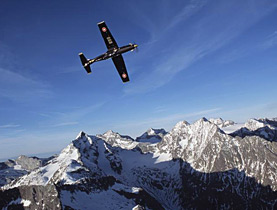Leuthard proposes solution to plane dispute

Economics Minister Doris Leuthard says countries receiving Swiss development aid should no longer be allowed to buy the Swiss-built Pilatus PC-9 training aircraft.
The plane, built by Pilatus at Stans in central Switzerland, has caused controversy in recent weeks after reports that the government of Chad had modified it to carry weapons and used it in bombing missions in the Darfur region of Sudan.
The report had rekindled a long-standing debate over whether the aircraft ought to fall under stricter legislation.
Leuthard told the Neue Luzerner Zeitung on Wednesday that making a link between sales of the aircraft and the granting of aid would reduce the risk of the plane being transformed from its original training purpose to carrying weapons.
Nevertheless, her plan would still keep export of the aircraft under the Goods Control Act rather than the much tougher War Materials Act.
Critics of the Pilatus sale say that the tougher act would have prohibited its export to the central African state.
Negative consequences
Leuthard has warned that applying the War Materials Act could have negative consequences for Swiss industry, with the loss of up to 500 jobs among the Pilatus company’s workforce of 1,100.
“If the military training aircraft were to fall under the law on war materiel, it might result in the company moving production abroad,” she argued.
Leuthard’s plan is a compromise on a contentious and long-simmering question.
In 1996, after intense lobbying by politicians from the centre-right Radical Party and the rightwing Swiss People’s Party, parliament voted against designating the PC-9 aircraft as an instrument of war.
When the aircraft was exported to Chad in 2006, the only restriction placed on the transaction by the State Secretariat for Economic Affairs (Seco) – the agency responsible for approving exports – was that the aircraft could be used for only peaceful purposes.
Shaking his head
Seco’s approval of the deal left parliamentarian Josef Lang of the Green Party shaking his head.
“We should have realised beforehand that the military regime [in Chad] would be unreliable,” he said. “It has violated other international agreements – with the United Nations for example.”
But former People’s Party parliamentarian Ulrich Schlüer, who lobbied for the legislation back in 1996, also argued there was a need to keep Pilatus in Switzerland.
For the company to survive, it has to deal outside its own borders, he said. “Swiss firms must be able to export so that they can exist,” adding that access to Pilatus aircraft was an important part of maintaining Swiss national security.
Lang finds this line of argument shortsighted.
“Whoever thinks about economic issues from a long-term perspective would know that the domestic market in a small country is not enough to support an arms industry,” he said.
Lang added that the same lobbyists who had initially succeeded in classifying the PC-9 under the Goods Control Act had essentially discouraged the Pilatus company from focusing future efforts on producing civilian aircraft.
swissinfo with agencies
Last year, Seco granted 2,457 out of 2,462 applications. The five applications rejected concerned weapons planned for export to Africa and had a total value of SFr600,000 ($554,984).
Pilatus and other Swiss companies exported defence equipment including aircraft, armoured vehicles and anti-aircraft systems around the world in 2007.
The aircraft constructor is no stranger to controversy. Some of its products have historically been categorised as dual-use, which means that they can serve in both civilian and military capacities.
Since the 1970s, its aircraft have seen action in countries including Myanmar, Guatemala, Mexico and Iraq.

In compliance with the JTI standards
More: SWI swissinfo.ch certified by the Journalism Trust Initiative











You can find an overview of ongoing debates with our journalists here . Please join us!
If you want to start a conversation about a topic raised in this article or want to report factual errors, email us at english@swissinfo.ch.